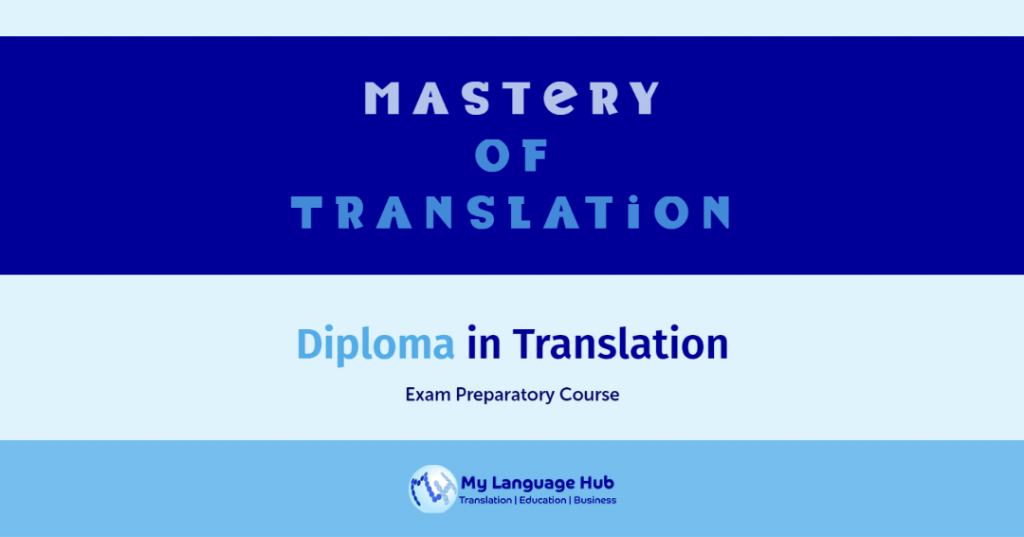
The flipped classroom
02/09/2019
Queen Elizabeth II
09/09/2022How to prepare for the DipTrans

Top tips on how to prepare for the DipTrans
Finding a job in the translation industry may seem like an overwhelming prospect, but with some preparation, you can ace your DipTrans exam and set yourself up for success. Here are some tips to help you prepare for your Diploma in Translation.
Routes to a professional qualification
I f you’re thinking about getting into translation, congratulations! What you need to understand is that the translation profession is very competitive. It's not as simple as just being fluent in two or more languages. Therefore, a professional qualification is a MUST.
There are two main routes:
- a university degree, or
- the Diploma in Translation
Now, which one you may go for will depend on three main variables: experience, time and budget.
A university degree in Translation
University degrees may take the form of a Bachelor, Master and, of course, a PhD, and here, the variables of experience, time and budget pay a huge part. If you are a complete novice and don't have any previous qualification, a BA (Bachelor of Arts) in Translation is your first option. It usually focuses on technical translation and provides practical work to develop the professional skills needed in translation. This is a 3-year programme as a full-time student and involves a financial commitment of approx. £9,250 per year. If you enrol on a part-time basis, the course may extend for another year or so, with fees of approx. £2,350 per module. These are fees for UK students; for overseas students, their much dearer: about £15,600 per year, full-time, and £3,900 per module, for part-time students, provided you have a student visa.
If you already have a previous undergraduate qualification, you may want to go for a Master’s programme. Some MA (Master of Arts) programmes focus on specific areas such as law, politics, medicine, business, IT and media, and other programmes are even more specialised, such as MA in Legal Translation, or MA in Audiovisual Translation. A Masters is a 1-year course if you are a full-time student, or 2-3 years on a part-time basis; full-time tuition fees are approx. £12,900 for UK students, and £26,600 for international students, again subject to visa application.
PhD programmes are recommended if your goal is to work in research or academia. You need to go through a BA, an MA, and then a 3-year PhD programme, which may extend to 4 years if you don't have enough experience in research. And this is if you enrol as a full-time student! Again, tuition fees vary depending on whether you are full- or part-time, and whether you are a UK or international student.
All this seems like a lifetime studying! But if you don't have the luxury of time and prefer a shortcut, I suggest you go for the Diploma in Translation.
The Association of Translation Companies (ATC), as a translation industry ISO expert, considers that the CIOLQ DipTrans provides strong evidence of both the ISO 17100 requirements for the professional competencies of translators and translator qualifications.
What is the Diploma in Translation?
The Diploma in Translation (DipTrans) is a professional translation qualification offered by CIOL Qualifications (CIOLQ), a UK registered and regulated Awarding Organisation providing professional translator and interpreter qualifications recognised by Ofqual.
The Diploma in Translation is an exam that grants you a post-graduate level qualification equivalent to a Master’s degree, i.e. MA or MSc. In short, the DipTrans is the equivalent to the final exam of a Master’s course in Translation. It is a world-wide recognised qualification by all professional translation organisations, not just in the UK, but also abroad.
The Diploma in Translation is also a recognised professional qualification under the ISO 17100:2015 in Translation Services. "The Association of Translation Companies (ATC), as a translation industry ISO expert, considers that the CIOLQ DipTrans provides strong evidence of both the ISO 17100 requirements for the professional competencies of translators (requirement 3.1.3) and translator qualifications (requirement 3.1.4)", states ATC CEO Raisa McNab.
The DipTrans exam is often regarded as one of, if not, the most challenging exams in translation. That’s why it’s so important to put time and effort into preparing for your DipTrans; it’s also important that you know what exactly you’re getting yourself into before attempting.
Why is the DipTrans so hard to pass?
The DipTrans may be the most difficult translation exam around, but it's not impossible! So, don’t lose hope! There are things you can do to prepare for it that will help you tackle it as calmly and successfully as possible. In fact, if you take a couple of steps before your test date, there’s no reason why you shouldn’t be able to ace it.
… many candidates understimate the seriousness of the exam
So, what makes it so hard? First of all, many people underestimate the seriousness of the exam. Because they can speak two or more languages fluently, they think they are fully equipped as translators. They go into the exam with relatively little or no preparation, and the result is not a good one.
Also, the exam means a lot of pressure on your shoulders. Not only are you preparing for your future as a translator, but also you have to get it right! If you fail, you may have to retake the papers and wait for another six months before being able to sit again.
The good news is that as long as you’re prepared, you can make sure your test-taking experience is smooth and stress-free. Here are three key strategies that will help you do just that: capitalise on your skills, manage your time and practise a lot!
How can you prepare for the DipTrans?

Studying for DipTrans exam is not an easy process. It requires hard work and discipline, but with time and perseverance it can be done.
The most important thing you must do before starting your preparation is focusing on your strengths. For Units 2 and 3 you will have to choose one paper from a semi-specialised area: Technology, Business or Literature, for Unit 2, and Science, Social Science or Law, for Unit 3. You may have studies or previous work experience or be naturally inclined to one of these areas. This is your starting point. If you go for an area that you find interesting and you enjoy, there are more chances of getting through them successfully.
Time management is also key. If you don’t give yourself enough time to complete each paper and proofread your translation, you will feel like you’re rushing on test day. Finally, practice makes perfect! Practising your translation skills will help you build up your skills so that you're ready when the test day comes.
You can prepare for the exam on your own, read a few books on translation and translate some texts. But, how will you know if you are on the right path? You will definitely need some guidance and support!
The second step is setting up your DipTrans prep course. If you decide not to go down that road, there are many resources available online and offline, so don’t despair. For example, you can search for a DipTrans prep courses and find several providers of different options. With such a busy life as ours nowadays, I recommend trying online courses: they are more flexible than classroom lessons. They also allow you to complete them at home with no problem. When choosing an online course, it’s good to look at its syllabus, contact information and reviews from previous students who have taken classes from that provider before deciding on what course to follow. Some providers may allow you to preview some of the course content before signing up with it full-time.
Mastery of Translation©️:
the online preparatory course for the DipTrans
The best way to pass your Diploma in Translation exam is through solid preparation. And if you decide to sign up for a course to prepare for your DipTrans, Mastery of Translation (MOT) is here for you. This online preparatory course will get you on track with the theory and practice that you need in order to step foot into that exam room, either physical or virtual. The course will cover all of the concepts you need to know, and it can be tailored specifically to your level of ability. This online preparatory course is designed with you in mind.
MOT also stands for Motivation, Organisation and Time. You can take the course at your own pace, and on your own schedule. Our fortnightly live sessions give structure to the programme, help you stay on track and provide an opportunity to answer any questions that may arise from the content. The course lasts 10 months and is designed to guide you all the way to the week before the exam.
The best way to guarantee your future success is with proper preparation. MOT wants you to be prepared, and we’re here to help you get there. All it takes is your decision and commitment to do it, sign up and follow our programme for 10 months until you take that DipTrans exam – and fly into your future!
Oh! One last important detail: the course fees are just a fraction of the total fees of a BA, for both UK students and overseas students alike!
Contact us today and take your first step on that path towards your new career. We’re waiting for you!








